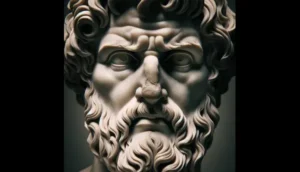Table of Contents
Biography
Lucius Annaeus Seneca, commonly known as Seneca the Younger, was a Roman Stoic philosopher, statesman, and dramatist born around 4 BC in Corduba, Hispania (modern-day Spain). He was raised in Rome, where he was educated in rhetoric and philosophy. Seneca’s career in public service saw various phases, including his roles as quaestor, senator, and advisor to Emperor Nero. His relationship with Nero soured, leading to his forced retirement and, eventually, ordered suicide in 65 AD under accusations of conspiracy. His life, intertwined with the politics of the Roman Empire, reflects the complexities and challenges faced by intellectuals in imperial courts.
His Works and Writings
Seneca’s literary contributions are vast and varied, encompassing philosophical essays, letters, and tragedies. His works are primary sources for modern understanding of Stoic philosophy. His philosophical writings, including the “Moral Letters to Lucilius” and essays such as “On the Shortness of Life” and “On Tranquility of Mind,” explore practical ethics and Stoic principles applied to personal conduct and inner growth. His tragedies, like “Thyestes” and “Phaedra,” delve into themes of passion, revenge, and fate, influencing later Renaissance and Elizabethan drama significantly.

His Philosophy and Beliefs
Seneca’s philosophy is deeply rooted in Stoicism, focusing on the control of the self through rationality and ethical living. He emphasized virtues like courage, justice, wisdom, and temperance. Seneca taught the importance of living according to nature and reasoned that human suffering arises from misplaced desires and the inability to accept what we cannot change. His thoughts on ethics, reason, and the ephemeral nature of life continue to resonate, highlighting his belief in the stoic ideal that true happiness comes from a life lived in harmony with the world.
*** Explore other Stoics – their biography, works, and beliefs.





